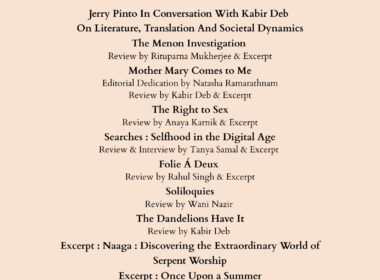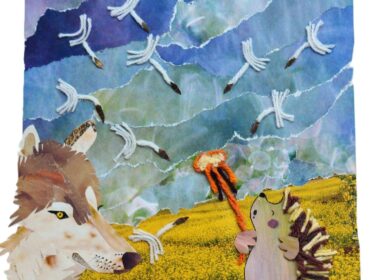Interview: Rituparna Mukherjee in Conversation with Volga

RM: Congratulations, Madam on the publication of the translation of your novel, On the Banks of the Pampa. It’s a slim book that packs quite a punch. Retelling myths from the woman’s perspective is one of the hallmarks of the feminist perspective. Interestingly, although you have dealt with the reclamation of Sabari and Kaikeyi’s narratives in brief, the novella is not just about that. What led you to the conception of this framework for the work?
VG: Thank you. You said it right. The novel is not entirely about Sabari. It dwells on larger questions about State, its oppressive nature, expansionist nature, about aggression, borders, boundaries, and citizenship. In the name of civilisation and scientific knowledge wars are turning into genocides. Nature is destroyed without caring about other living beings. Environmental destruction is going on. People who protect or want to protect nature and environment are looked upon as uncivilised, anti-development and they are targeted as anti-socials. The whole world is roiling in war. War, destruction, nuclear weapons, is it all sane?
I wanted to ask these questions from the viewpoint of a tribal woman or a forest dweller. I found Sabari whom we all love.
Matanga Muni and Sabari are right persons from mythology to ask about the nature of civilisation and the so-called development. So, the concept of the novel is critiquing the contemporary world filled with hatred, violence and war. Emphasizing the importance of the peaceful and loving coexistence between nature and human beings.
The Aranya Kanda of Valmiki Ramayana, Valmiki’s description of forest near Pampa tempted me so much to make Sabari and Matanga Muni the co protagonists along with the forest. Then the whole story fell into place.
RM: What would you say is the power of approaching a predominantly patriarchal text from a feminist lens? How do retelling of myths make them relevant to the present readership, and through translation, to a wider audience? What have you tried to achieve in this particular work because it is very focused?
VG: Feminism always analyses patriarchy and patriarchal texts. It tries to subvert the theme and characters. Patriarchy always tries to hide or throw into insignificance the agency of oppressed people. Feminist retellings try to throw light upon those characters and through them subvert the patriarchy. By doing this, feminist narratives give strength to people of contemporary society to raise their voices.
I believe that the purpose of literature is giving strength to the weak, courage to helpless, and the power to change their lives.
Mythology or epics are influencing people’s lives in many ways. People love, hate, and often make those characters as their ideals. They easily relate to those characters. By retelling and subverting we can make people think and understand those characters differently from entirely new perspectives which are contemporary.
RM: In the epilogue, you mention about the power of sisterhood. Women are often the carriers of patriarchy, willingly or unwittingly, which is also shown in the text. How does one adhere to the strengths of sisterhood, especially in the age of digital media?
VG: Sisterhood is never projected as important as brotherhood. Patriarchy always glorifies brotherhood. Every relationship between women is embedded with some kind of enmity. I want to change it. Women in every society help other women but in a different way. Patriarchy never allows women to be directly involved with any agency. So, women find their own ways and it is important to highlight those actions. In contemporary society sisterhood is a powerful tool to struggle with patriarchy.
RM: You mention that aside from the Valmiki Ramayana there are several other readings and interpretations of the Ramayana that exist in the cultural milieu through the oral tradition. How important do you think orality is in upholding alternative spaces for wisdom and solidarity? Have you referred to any such source in the writing of this novella?
VG: Oral literature or Moukhika Sahityam is very important in understanding women from the past centuries. Then women are not literate enough to write or society didn’t allow them to write. But the imaginative power and creativity made women create oral literature. Songs, dwipadas, stories which have travelled through time. A lot of preservation efforts and research is going on in the case of oral literature.
In contemporary society also, the percentage of literate women is not high in many communities. They still practice the tradition of oral literature.
For this particular novel I didn’t get any oral sources. This is purely my imagination.
RM: In this novel you delve into the anthropocentric greed for power and how that is constructed and condoned by the state mechanisms. At the same time, you have situated your narrative in the mythological era, the very text that is being vastly used to project a singular and monolithic form of leadership. Why did you choose this particular setting for your novel?
VG: You talk about a singular and monolithic form of leadership. That is very destructive. People, institutions, environment- everything will be in danger. Dissenting that power structure is needed. Sabari raised that concern.
RM: You also dwell very lucidly on the system of ‘nagarikata’ or citizenry and its highly evocative of the times we live in. How important do you think is literature at present especially in times of increased surveillance of academic and literary spaces?
VG: I believe we have to assert those academic and literary spaces and make them our own.
RM: You have utilized space very efficiently in the novel and half of that narrative space is devoted to the description of the restorative power of nature on the banks of the Pampa and the happiness of the ‘aranyavaasis’. Is that a realization of your feminist vision of moving away from an anthropocentric world to a more eco-centric world?
VG: Yes. In one of my dance ballets titled “Lakshmana Rekha” I wrote a song that will perhaps answer your question.
“Woman as Nature
Man as the patriarch
And the destruction
Of Nature as Civilisation
The power studded
slavery is going on.
Realise how
Gruhapatni changed as Pativratha
How women defeated and
Lost their mother right forever.”
It goes on like this.
Patriarchy always talks about Prakrithi and Purush, that is, nature and man in unequal, hierarchical terms. Women want to change it and establish peaceful coexistence.
RM: In the dichotomy between the city and the forest, you have approached both the spaces from the point of view of power structures and flow. Most of your readers live in structured urban spaces or rural spaces which operate under specific power systems. Can nature spaces, in this age of over-tourism, ever be free of systems of control?
VG: Unless people struggle to free themselves and nature from authoritarian control, earth will be in trouble. Everyone knows it but few people really care. That number should increase. May be literature will help.
RM: Which specific feminist vision would you like to realize in your next work? When can we look forward to it?
VG: I am deeply worried about the growing violence, insanity (Unmaad) within the society and people’s psyche. I am planning a theme for a novel around this issue.




